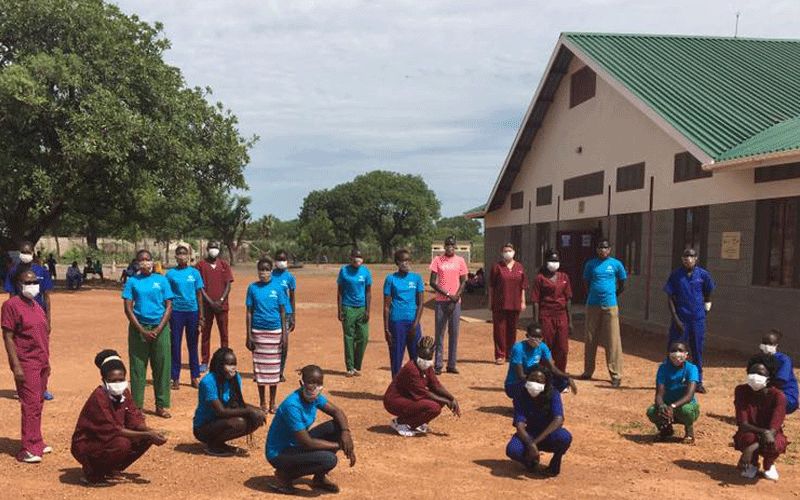Mary Ward Primary Health Care Clinic, which opened in 2016 welcomes four graduates to work as interns at the clinic every year.
“These interns come from our own past pupils and other schools around,” Sr. Orla says, explaining the recruitment of nurses at the clinic.
Among the six nurses, two are former interns at the clinic and another two are health professionals trained in other health institutions in the country. There is also a Kenyan and Ugandan at the clinic.

“All the trainee nurses at the clinic have gone through our internship program in the clinic and are in different nursing schools in CHTI Wau, Juba and Nairobi,” says the award winning nun who also manages other projects in the world’s youngest nation.
(Story continues below)
She adds in reference to the trainee nurses, “When the coronavirus closed down the schools, they chose to come back and work with us here.”
Initially the trainee nurses educated the community on coronavirus and hand washing. Today, along with the nursing team, they offer health talks and mobile clinics, the Catholic nun says.
“Our interns are all waiting and hoping to apply for nursing school and medical schools as soon as the learning institutes re-open,” she says.

Meanwhile, in South Africa, Bishops have commended the nurses for their heroism and self-sacrifice as the country battle against Covid-19.
In their statement on the year’s International Nurses Day Tuesday, May 12, the Southern African Catholics Bishops’ Conference (SACBC) stated, “We join President Cyril Ramaphosa and the whole country in thanking our nurses in South Africa who, being at the frontline of the response against the COVID-19, have shown us an example of heroism and self-sacrifice.”
The Bishops noted that with over 10,000 Covid-19 infections in the Southern African country, the work of nurses in the country had gone beyond just screening and treating patients and that it is now “more than a profession, but a vocation that involves dedication to the common good.”
“Besides providing treatment to those infected, nurses have provided much-needed support to the dying and those who have lost loved ones because of the disease,” the Bishops said, and added, “Our nurses are more than nurses.”
Echoing President Cyril Ramaphosa’s words, the Bishops said, “They (nurses) are community-builders, mentors, counsellors, and educators who provide psychosocial support beyond the medical domain. Without our nurses, particularly those working in under-served parts of the country, South Africa’s fight against Covid-19 would be lost.”
The heads of the Catholic Church in the three southern Africa nations of Botswana, Lesotho, and South Africa called on the government and other stakeholders to always ensure the nurses as well as other frontline healthcare workers, especially those working in marginalized and remote communities, have adequate access to the means to protect themselves against the disease “today, tomorrow and the days after”.
“According to the latest statistics, over 500 healthcare workers across the country have tested positive for Covid-19, of which several have died, including nurses,” the members of SACBC said.
“We mourn these unsung heroes whilst keeping them, their families and their colleagues at the frontline, in our prayers,” the Bishops said in their May 12 collective statement signed by Archbishop William Slattery.
Agnes Aineah is a Kenyan journalist with a background in digital and newspaper reporting. She holds a Master of Arts in Digital Journalism from the Aga Khan University, Graduate School of Media and Communications and a Bachelor's Degree in Linguistics, Media and Communications from Kenya's Moi University. Agnes currently serves as a journalist for ACI Africa.










